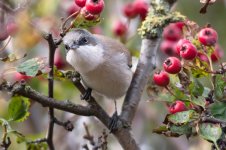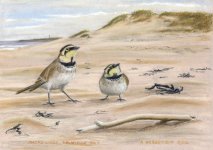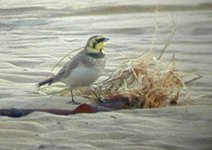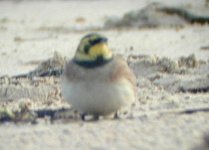I'll say one thing here and that's go birding for a few years before doing photography.that way you'll learn the habits of the birds that you're hoping to photograph later.things like the weather time of year time of day all come into play.if you look at art morris the american bird photographer you'll see that followed the same path of birder first then photographer.
Cheers.
Steve.
More halo-polishing, it seems. Excuse me If I've picked you up wrongly.
Birders aren't some higher form of life and there's more to being a photographer than taking pictures of birds, although I understand that many birders have a certain image in their minds when they utter with disdain the word 'photographer'. It's somebody with a lens that's bigger than the birder's scope, I reckon, although it's true that some folks that you find in hides can't tell a sparrow from a sparrowhawk (and I'm not just talking about the photographers -we all had to learn). My modest 400mm isn't much bigger than my Kowa, so maybe I get away with it.
Where does that place me? Am I a 'birder' or a 'photographer', assuming for a moment that the two are mutually exclusive and a 'birder' just happens to be someone without access to, or interest in, a camera?
Since I was a child I've had an interest in birds, I was identifying species as soon as I had access to the Observers' Book of Birds and later the Oxford Book of British Birds from the County Library ( I bought a copy of that from E-bay just last year, not because I needed it, but for old time's sake). I used to copy the illustrations as well as learning the appearance, seasons and habits of the birds when I should have been doing homework.
Equally I've had an interest in cameras since I first saw my father's 'bellows'-style 120 that he used to take family photographs with, but only on sunny days that the camera could handle, in the 1950s. That camera still stands on a sideboard in our sitting room as an ornament and memento.
In the late 60s I was developing and printing my own photos in the school darkroom, but none of them were of birds, because I had no means of photographing them with my 35mm Halina. That didn't mean I wasn't interested in birds, although the term 'birder' didn't exist at the time.
By the mid/late 70s I had a bird guide 'The Birds of Britain and Europe' and I thought it would be interesting after I'd had it for a while to 'tick' the birds in it that I'd seen just to count them, although at that time I knew no other birders and had no idea that bird lists existed. I'd also never heard of 'ticking'.
Later still I was still taking photographs in large numbers, but none at all were of birds, because you needed to be loaded to buy the kit. I did by then find the cash to buy my first binoculars and my bird-list grew, but I had no means of knowing whether it was good or not, because there was nothing to compare it with - it was just personal interest.
By 1999/2000 I bought my first scope and a couple of years later I started experimenting with taking photographs through it with my company's digital camera after I'd seen a magazine article. I got some very poor, blurry images at Linton and elsewhere in the locailty that I used as the basis of some pastel drawings (copy of one of my early efforts below and the two atrocious digiscope experiments from Dec 2001 that it was based on - the original's on my wall). Later my ability at what was then called 'digiscoping' improved after I bought my Coolpix in 2002. Then the photos took over and I hung back on the drawings.
later still I got a Lumix bridge camera and about 5 years ago my first DSLR and 400mm lens. At last I could take the photos of birds that I wished I'd been able to take when I was at school in the 1960s.
In the last couple of years I packed in the year-listing after I got a dose of sanity and realised it was (a) a waste of petrol and (b) an even bigger waste of time. Now I want to get good photos of birds, not necessarily rare ones, while adding the odd special to my life and county lists.
So what does that make me?
A birder. or a photographer?
I need to ask, because it seems to me that in the eyes of many over-precious birders, you can only be one or the other and If you've got a camera lens longer than your nose you can't be a birder. I maybe need to tick a box to identify which I am, but I'm buggered if I know which box to tick.
What is it about birders that makes so many of them think they are special?
Sorry about the rant, but it just pulls my strings to see all the pointless birders-v-photographers sniping on Birdforum, as if the two hobbies were somehow different, exclusive to one another and at odds.








